Erica Lindquist's Blog, page 5
March 23, 2016
Uh, why a mailing list?
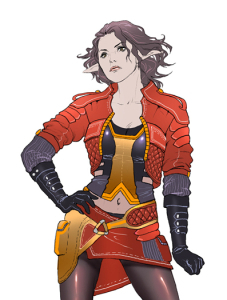
Maeve says this is a thing you should do.
…Really, I just like this picture and wanted to post it again. Look at her hair!
That’s a very good question! I have a website, a Facebook account and a Twitter account. Why on Earth would I need a mailing list too? You know, besides an excuse to give each of you a free book.
If you’re a self-published author, then you probably know the song. Because Facebook isn’t predictable about displaying posts, even if you pay them. Because Twitter is time-sensitive and if you follow more than fifty people, noticing one particular tweet is not going to happen. Because most readers aren’t exactly watching my website like a hawk (that would be boring as fuck) and even if they subscribe to the RSS feed, that’s for this blog, not book pages.
When I have new books or want to give out advance reading copies, I need a better way to contact readers. I’ve been resisting building an email list for… jeez, a couple of years now. I need a new thing to manage like I need a flaming bowling ball dropped on my hands. At least, I used to be swamped. But with Amber’s help, I finally have enough free time to get started. Yay?
And now I have a mailing list. Ta da!
So if you want to know when we publish new stuff and get a free ebook selected from our entire catalog, sign up.
Obviously, I still need some practice pitching this thing…

March 21, 2016
Our process, part 2: Outlining
Sorry for the delay, everyone! I had intended to get to this post earlier, but it’s been a long week. Friends in the hospital, an RPG campaign to finish this weekend and a funeral to fly down to at 4 am the next day. I’m already tired.
But I finished the re-write pass on Lily Quinn #9 (which doesn’t have a page yet and is titled A Made Man) and have a little time to blog. We’ll get to the part where I explain the re-write pass in a couple of posts, when I talk about manuscripting.
(If you haven’t read the first part of this series, it was about concepts/ideas. It’s not required reading or anything, but it might be helpful.)
 This post is all about outlining! If you’re already a writer, then you’re probably heard talk of pantsers versus plotters, or outlining versus discovery writing. Both of these come down to the same thing: do you like to plan your book out ahead of time or figure it out on the fly (or by the seat of your pants, as the first name implies)?
This post is all about outlining! If you’re already a writer, then you’re probably heard talk of pantsers versus plotters, or outlining versus discovery writing. Both of these come down to the same thing: do you like to plan your book out ahead of time or figure it out on the fly (or by the seat of your pants, as the first name implies)?
This post will be of absolutely no use to you if you’re a pantser. I pantsed my first two books, but have since then become a very firm plotter. It’s considerably less romantic, but I’m a lot happier.
Okay, I wrote a whole story here about how I fucked up In the House of Five Dragons and how that led me into becoming a plotter. Then I deleted it because that’s really not what matters here. The long and short of it was that I had to throw away months of work because I didn’t know where my story was going and became determined never to waste that much effort ever again. If we ever meet in person, ask and I’ll tell you the whole crappy story, including about how much I cried.
Spoiler: It was a lot.
So now we outline! It took a lot of iterations before Aron and I nailed down our process, but now it pretty much looks the same for every book – three outlines in increasing levels of complexity.
We’ll use an example concept: An evil alien sandwich wants to take over the world.
Level 1 outline
Once we have the concept, Aron and I sit down (usually over a dinner at our favorite restaurant, but this part is optional) to figure out the most basic events of our story. This outline takes one session of work and ends up with between three and ten bullet points.
– Sandwich arrives on Earth. (Method? Are we talking ship or teleport? Both?)
– Sandwich is picked up by human. Human attempts to eat it. (What do was want to do with this human? Real enemy or do they make up in the end?)
– Sandwich is furious. Decides that all humans are horrible monsters and that Earth must be conquered for the safety of all sandwiches.
– Develops evil plan. (Involving bologna? Maybe in ironic turn, requires other foodstuffs to carry out plan.)
– Carries out evil plan. Is thwarted by the love of humans for all things sandwich-y. (Do we use original human here? Maybe union of humanity and sandwich?)
– Epilogue showing happy lunchtime future.
Pretty bare bones, as you can see. But it needs to be at this stage. It’s easy to get bogged down in the details and lose track of the big picture, which is what we need at this point. We don’t want to lose any of those little questions and sparks, so we write them down for later consideration, as in the parentheses above.
Aron: Actually at this point can we add a step where I throw something at you for suggesting a sandwich story? An evil alien sandwich?
That’s usually it for the first session of outlining. We let it sit in our brains for a few days while we work on other things. When we come back, we make sure that’s still what we want to happen. If not, we revise and repeat. If it is good to go, we move on to the level 2 outline.
Level 2 outline
We used to call these ‘orbital level’, ‘map level’ and ‘detailed outline’, but eventually just started using numbers. I’m not sure why. Maybe it was easier. It’s certainly more streamlined than the original names.
The level 2 outline takes a lot more time than the first one, but this one Aron and I still develop together. This will be a week or more of dinners and tapping notes like crazy into my phone, then expanding on them once I get back to my computer.
While level 1 is about what happens, level 2 is about why and how. We already know what we need to happen. Now we need to make the progression make sense and feel natural.
– Sandwich arrives on Earth.
– – Arrives by bologna beam. Always leaves a distinctive smell in its wake.
– – Lands in a park. Easy place to be noticed and picked up by a human.
– Sandwich is picked up by human. Human attempts to eat it.
– – Human in this case is a child. This will make it pretty obvious that the enmity isn’t deadly. They’ll ally in the end.
– – Kid is just hungry. A bully took his/her lunch and they’re glad for something to eat.
– – One bite is taken before the sandwich slithers away.
– Sandwich is furious. Decides that all humans are horrible monsters and that Earth must be conquered for the safety of all sandwiches.
– – Alien sandwich takes refuge in refuse, garbage can. Good place for thoughts of gloom and doom.
– Develops evil plan.
– – I’m thinking that our sandwich will take inspiration from the trash he’s in.
– – Trash cannon? Aliens all have telekinesis, right? How about a TK trash launch?
– Carries out evil plan. Is thwarted by the love of humans for all things sandwich-y.
– – Sandwich TKs himself and trash up, launches at the kid.
– – But kid is involved in altercation with bully again.
– – Sandwich slats into bully’s face.
– – Sandwich is the hero for getting the bully and celebrated by kid. Ever seen a kid hug a sandwich?
– Epilogue showing happy lunchtime future.
– – Sandwich goes home with kid. Is carried to school every day without going moldy. It is, after all, an alien sandwich.
– – Weird, but there you go.
That’s level 2! We have details of how things are going to happen any why.
Aron: I have now been won over by the sandwich story. The bologna beam was my idea. What Erica isn’t showing are all the failed attempts. Sometimes we’ll get this far and end up stuck on a bullet point, banging our heads against it for a week before we get lucky and come up with something that makes sense, or we admit that we must have done something wrong and we spool it back to the last part where it worked.
Erica: That’s a fair point. When coming up with the “trash cannon” idea, I went through three or four different iterations, some of which involved raising an army of discarded food items, but that logically didn’t work, since our sandwich is only sentient because it’s alien. I considered some kind of alien-food mind-transfer, but that raised questions that felt like they distracted from the main story. It took a couple of tries before I settled on the misfired trash cannon.
Level 3 outline
Okay, that level 2 outline got kind of long. If I do a full level 3, we’re going to be here all day.
While Aron and I work level 1 and 2 outlines together, I typically do the level 3 outline on my own. It takes so long that we can’t really manage it over dinners with cell phone notes. For the final outline, I need a laptop, a soda and up to a couple weeks of work. By the time I give it to Aron, the outline might be ten thousand words long.
This final outline includes every detail that I can think of ahead of time that I want Aron to include in the manuscript. For example:
– Sandwich arrives on Earth.
– – Arrives by bologna beam. Always leaves a distinctive smell in its wake.
– – – Cooked meat. Like cooked bologna, specifically. Not that the sandwich thinks of it this way. But if you can evoke the feel of bologna, great.
– – Lands in a park. Easy place to be noticed and picked up by a human.
– – – Probably because I’ve been working on a lot of Lily Quinn, I’m thinking of Gates Park. Grassy, open.
– – – But this is a place where kids are going to be hanging out. Preferably lots of kids for the ending in which the bully will be brought low.
– – – Playground. Brightly colored and well-maintained even this close to the coast. This is a light story and run-down playgrounds are for horror stories.
– – – Bright weather, clear skies. Makes it easy for the alien sandwich to land and also sets a bright tone for the story.
– – – Coastal plants, grass and ice plant. Sandy ground and redwood trees. Seagulls, too, especially where the trash can is concerned.
– Sandwich is picked up by human. Human attempts to eat it.
– – Human in this case is a child. This will make it pretty obvious that the enmity isn’t deadly. They’ll ally in the end.
– – – I’m thinking not much in the way of a standard physical description of kid here. What the hell does a sandwich care about the nuance of skin, hair and eye color? To him, the strangeness is limbs, lack of bread and even having a head.
– – – Describe child in terms that feel as alien as possible, while still describing an obviously human child.
– – – Liken clothes to bread, the outer covering. Bread is the space suit for our alien? What do you think, Aron?
For a book, there are pages and pages of this. While he’s writing up the manuscript, Aron’s welcome to discard any of my ideas. He might come back to me later, saying that it just felt different at the time or the idea as presented in my outline didn’t work on the page. How can he describe a child in alien terms but still make it clear we’re looking at a human child?
That’s fine. The outline is just a framework. It tells us where we plan to go and gives an idea how to get there. If something else better occurs to us along the way, that’s great! We don’t throw ideas out just because they’re not in the outline, but that outlines gives us something to work those ideas into. The outline isn’t meant as a rail we can never deviate from, but a map to make sure we’re never lost.
Aron: For me, I need momentum. If I have a vision of how the scene is going to play out, I chug along pretty quickly. I’m not the fastest writer ever, but I did 50k words in two days. That’s NaNoWriMo in two days, which isn’t bad. But if I have to stop and think of what needs to come next, I start slowing down. That’s what this level 3 outline gives me – a checklist of important bits I need to cover and as many details as Erica can give me so I don’t have to stop to think.
Erica is very nice, she lets me leave little editing tags for things I want her to look at in more detail. I will be writing away about this sandwich and come to discussing the condiments and just drop in >>put fancy mustard here, because I can’t be bothered to stop and research mustards. I just write and don’t look back, not until Erica’s had her way with the rough manuscript and I review her work. Yeah, sometimes I end up just writing along and drift off the outline, but that’s where we let some discovery happen. As long as all the important things happened and we have a path to the next important bit, we’re good.
Erica: Well, I was going to go into this more in the manuscripting post, but… yeah. I spend a lot of time filling in gaps in the first draft.
And now that we have the completed map, it’s time to write the manuscript! The next post in this series will be about the process.

March 17, 2016
Random update
I’m back from a family funeral down in LA. I actually got back late Tuesday, but I’m only now started to catch up on rest and feel something like a functional human being again.
 It was a hard trip. For a variety of reasons, this was a difficult time for a lot of my family. My sister and I got up to fly out of our home cities at 3 am and 4 am respectively and didn’t have a chance to catch our breath until somewhere around 11 pm local time. The next morning was a lot of talking, worrying, one Hulk-hangry sister (she was eventually mollified with Chipotle), and then navigating LAX to get home.
It was a hard trip. For a variety of reasons, this was a difficult time for a lot of my family. My sister and I got up to fly out of our home cities at 3 am and 4 am respectively and didn’t have a chance to catch our breath until somewhere around 11 pm local time. The next morning was a lot of talking, worrying, one Hulk-hangry sister (she was eventually mollified with Chipotle), and then navigating LAX to get home.
I’m home. I’m safe and tired, but recovering. I’m working on the next post in our process series. Apparently, that first post on ideas wasn’t exactly a precise indicator. The second post – which is about outlining – is turning out to be a lot longer and more complex. I’ve got the time to focus on it and finish, though, so I hope to finish the post and hand it over to Aron for review soon.
What else is going on in our writing? I just finished the manuscript for Lily Quinn #9 and gave it out to beta readers. I’m particularly chewing my nails over this one for reasons that would be extremely spoilery, so I won’t go into them here. But one reader got back to us Monday night and proclaimed it good. Whew!
That leaves just three more Lily Quinn books. Three! I always feel like I’m stuck in the middle of a project forever, and then I’m suddenly at the end. Holy carp! Ideally, that means about three more months of work for me, though it’ll more likely be closer to four. But when that’s done, then I get to go back to Dark West! Those books have been sitting on my hard drive for a year now, waiting to be done. I can’t wait to get to work!
The rest of this week, though, will be eating a lot of yogurt, taking naps and binging on the Iterate and Optimize podcast.

March 6, 2016
Learning from Trigun
I’ve spent the last six months running a Trigun tabletop RPG. The game has been a challenge and it’s forced me to deal with something that’s rather applicable to both writing and gaming. So I thought I’d share.
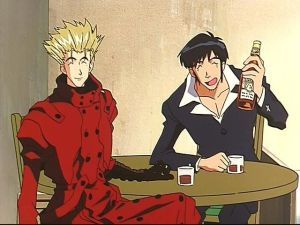 I probably won’t run a setting like Trigun again. I have no particular problem with the sci-fi or western aspects of the Gunsmoke world, but there’s an absolutely ludicrous sense of humor that’s a vital part of Trigun. I’m not very good at the funny stuff – pretty much any joke in our books was written by Aron/Eric. In fact, my lackluster sense of humor is itself kind of a joke in my home. Anytime I make a halfway decent joke, Aron cheers. It’s that rare and worthy of celebration.
I probably won’t run a setting like Trigun again. I have no particular problem with the sci-fi or western aspects of the Gunsmoke world, but there’s an absolutely ludicrous sense of humor that’s a vital part of Trigun. I’m not very good at the funny stuff – pretty much any joke in our books was written by Aron/Eric. In fact, my lackluster sense of humor is itself kind of a joke in my home. Anytime I make a halfway decent joke, Aron cheers. It’s that rare and worthy of celebration.
As a result, my Trigun game has fallen a little flat in terms of humor. The players are wonderful and absolutely do their best to help me out with jokes of their own. But there are an awful lot of times that my game feels more like a semi-serious sci-fi western, like Rifts, than like Trigun. I studied the world lore, but it just isn’t the same without all of the jokes.
Games that require a sense of humor simply aren’t my strong suit, I’ve discovered. So when Aron and I started talking about running a Lily Quinn game (which is its own weirdness), we decided pretty early on that it was a setting that Aron would have to run. Not me. I know the Quinniverse every bit as well as Aron, but he’s the funny one. And without a hell of lot of perverted jokes, it just wouldn’t be Lily Quinn.
There’s nothing wrong with limitations. Just be aware of them.
I’m certainly not advocating never improving on weak areas! But a sense of humor can only be trained and taught so much. I’ve tried repeatedly, but being funny just isn’t one of my talents. It’s one of Aron’s, though. Especially if you let him joke about sex, he’s a riot. So I acknowledge my weakness and take advantage of his strength.
There are other things that I’m good at. I run a lot of White Wolf World of Darkness games and I’m pretty good at that. I’m good at mysteries and good at dark, so WoD is a natural fit for me. So when the time comes to try out Wraith for the first time, I’m going to be the one running. But when it’s time for a funny game, I’ll be looking at Aron.
No one can be good at everything. That’s what coauthors, beta readers and other co-creatives are for. Utilize them.
Next weekend should be the final session of my Trigun game. When it’s over, I know that I will feel incredibly accomplished. Storytelling – both running RPGs and writing – has never come easily to me, and every time I complete a game or book, I’ve managed to do something difficult. It’s deeply, truly satisfying.
But I’ll be relieved to be finished.

March 3, 2016
Swearing in books
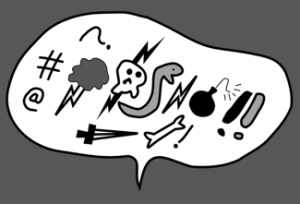 I swear when I write and so do my books.
I swear when I write and so do my books.
That wasn’t always the case, though. In my first two books, Anvil of Tears and In the House of Five Dragons, I didn’t include any swearing. Sure, Tiberius cursed a little and Carce had its own sort of vocabulary, but nothing that would really be recognizable to the readers as profanity. And that made sense for those books – why would either Prianus or the Carcaen Empire have the same swearing as we do? It was easy to just leave those words out.
The first characters that ever swore in our books were Sam Trent and Samantha LeFevre in The Dead Beat.
A quick side note: Yes, those names. I thought I was being pretty fucking smart. I was so, so very wrong. So for the rest of this post, I’m going to call them by their last names.
Trent was a seasoned cop back in the 1940s and LeFevre was a bitter, slightly unhinged homicide cop. It just didn’t feel remotely believable that these two wouldn’t swear up a storm. We expect hardened cops to swear. It’s practically a job requirement.
I was terrified. I had written as honestly as I could to the characters as I created them, but I worried that readers would be absolutely scandalized when they read the word “shit.” And some readers didn’t like it. I’ve gotten some negative feedback about swearing in books, including the tired old “You’re better than that.”
At first, I was badly shaken by this response. Was I failure? Had I just cheapened my work? Some of the feedback came from my own family and it hit like a hammer.
But I got over it. Time heals even the worst gut-punches.
Fuck it. I’m going to swear. I’m an adult living in a time when I actually need to fear that Donald Trump might become the next president. I’m definitely going to swear. And so are my characters, if it’s natural to their voice. In Whisperworld, Julia swears quite a bit – she’s the mouthy one. She needs to swear. Zach doesn’t swear much, which makes sense – he’s the good boy. Same thing in Lily Quinn: Lily is a wild woman and curses like one, but Max only swears when he’s angry or scared.
Some people are uncomfortable with profanity. Fine, I get that. Most of my books aren’t for that crowd. Also fine. I don’t really like Charles Dickens, but I’d be a lunatic if I said his work didn’t belong on bookshelves.
And if you’re a writer who doesn’t like to cuss, that’s fine, too. Just be sure that it feels natural for your characters. A world-weary prostitute who doesn’t throw out the occasional ‘fuck’ (You see what I did there?) is going to stick out in your manuscript just as much as a sweet old nun who swears like Deadpool.
In the end, be true to yourself and do right by your fucking characters.

March 2, 2016
Guilty confession
Okay, guilty confession time. When I’m home alone or out walking alone, I dance along with the music in my headphones. And I don’t mean just bopping my head white-girl style. I mean full-on high kicks and weird arm wiggles that I’m pretty sure make me look like a package of hot dogs having a seizure.

This is NOT me.
But in my head, my dyslexic fusion of club and belly dancing looked badass. Tonight, as I was cavorting around like a cracked-out squirrel, I contemplated giving up writing to pursue a YouTube career in dancing to copyrighted songs that I was totally sure I can secure permission to use. What big-name musician wouldn’t want to give me right to use their songs to play alongside my noodly arm-wiggles?
And then I smashed my finger moving a rock out of my way and came to my senses. I don’t really want to dance for a living. I know that I can’t dance and furthermore, I don’t really even want to. It’s just the music. I can’t help moving along with the beat when I hear it.
Assuming that I have any talent for writing, the one thing I would trade away in a second for is a musical ear. The only thing that touches me more than a book is a piece of music. Songs move me to tears and to… well, move.
I love music. That’s not to say I have good taste. I have terrible taste. I’m pretty sure that I listen to the music equivalent of fast food. That’s part of my utter lack of musical talent – I have no idea what’s good. I only know what I like, what makes me break out in spastic dance moves.
When I was in high school, I even took a few years of voice lessons. I wasn’t the worst, but I was a hell of a long way from the best. I’m an alto with about two octaves of range, and even that gets pretty squeaky around the edges. And as for reading music… Yeah, I never even got close to managing that. I can’t hold a pitch in my head for more than three seconds, much less read one off a sheet of music.
But if a djinn ever offers me a wish and I swing a deal for some sort of musical genius, I’m out of here!
Maybe.
…I really like writing.
Damn. Okay, Back to work writing books.

February 26, 2016
The War of Art
When I first got started writing, every author I knew recommended the same three books: Bird by Bird by Anne Lamott, On Writing by Stephen King, and The War of Art by Steven Pressfield. Seriously, these books seem to be the three gospels of the writers’ bible.
I read the first two in pretty short order. (That is, within 2 years. For me, that’s pretty snappy.) They were craft books, more or less, and I loved them. Not that I’ve followed every piece of advice, but I had just written my first novel – practically in my own blood, based on how much it hurt – and was looking to educate myself a little better on the process.
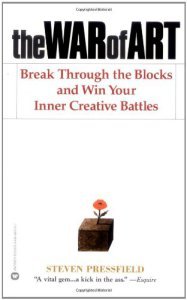 But I stalled for a long, long time before reading The War of Art. I had been told it was more a mentality book, a set of ideas and philosophies that applied to a variety of arts. I was already committed to writing and had written several books. What could it have to teach me?
But I stalled for a long, long time before reading The War of Art. I had been told it was more a mentality book, a set of ideas and philosophies that applied to a variety of arts. I was already committed to writing and had written several books. What could it have to teach me?
So I put it off for a long time. Finally, about eight months ago, I finally bought the ebook and audiobook. Still I didn’t read it. For a time, I was pretty pleased with myself just for owning all three books.
Finally, I finished the Newsflesh Trilogy by Mira Grant (which took me a long while) and wasn’t ready to dive into another novel. The War of Art was a short book, so I decided to give it a go while I caught my breath.
I wish I had read The War of Art a long time ago. I have learned a lot of the things that Steven Pressfield had to say, but with a lot more pain and trial-and-error than I could have just by reading his account of the creative process and resistance to it.
But there was something important that I got out of The War of Art, and it’s the whole reason I’m writing this rambling post. This is a respected book by a respected author and it gave me permission to be scared. To always be scared.
Whenever I do anything creative, I’m terrified. When I run a role-playing game, I can be pretty well guaranteed to vomit before and sometimes during the first half-dozen games. I curl up with a blanket and cry just about every time we release a new book. I’ve been at this for something like a decade now and I’m still scared.
How often did I panic about the panic? Surely real authors eventually stop being scared out of their wits. What if my pain and terror meant that I was just ill-suited to being a writer? That was even more horrifying an idea than any one-star review. But The War of Art held up my fear and said, “This is okay. This is part of the process. Write anyway.”
Maybe that should have been a slap in the face. What, I’m always going to be frightened? I’m always going to throw up before a performance? But that wasn’t the effect. I’ve been at this long enough to know that the pain was never going away. Now, I have permission (which I shouldn’t have needed, but I’ve got it anyway) to feel it, to let it happen and create anyway.
If you fear your creative pursuits, or just fear the fear, I highly recommend The War of Art. Not every part will be of use to every creator, but I got something truly invaluable out of it.

February 25, 2016
Our process, part 1: Concept
 Okay, I’ve been meaning to start this series since something like 2014. But, as you may have noticed… Well, I didn’t do it. Quite frankly, I’d rather be writing a book that write a post about how I write one. It’s an important thing to document, though. It holds me accountable to my own process and shares it for anyone who might find the information useful.
Okay, I’ve been meaning to start this series since something like 2014. But, as you may have noticed… Well, I didn’t do it. Quite frankly, I’d rather be writing a book that write a post about how I write one. It’s an important thing to document, though. It holds me accountable to my own process and shares it for anyone who might find the information useful.
A quick note: This is only a discussion of how Aron and I write and publish our books. If anything we talk about is useful to you, great. But no one process works for everyone. I don’t swear that if you follow these steps, you’ll walk away with a completed novel. Everyone has to write their own way, but it’s usually helpful to at least look at someone else’s process.
This is going to have a few parts, because so does our process. Part one will be the concept – obviously. You read the title of the post. The second part will be about our outlining process. Part three will be drafting the manuscript. Part four is finishing the manuscript. The fifth and final bit will be our publication process. Does that sound tedious? Yeah, it kind of is. But when I’m done with all the steps, I have a book!
Mom, where do story ideas come from?
The first part of this little series was actually going to be outlining, but when I started writing, I realized that I needed to cover the concept phase. I had intended to spend just a paragraph or two on that as a sort of zero-level outline before I got into the nitty-gritty of our outlining process. Once I got started, though, I realized that the concept is a phase all of its own. A four-part series became five.
Aron: Should have outlined the posts first!
 Fine, then. Let’s talk about concepts. Even those who have never written a single book know about this part: the spark, the idea, the thing that sets a fire in your heart and under your ass to write a story.
Fine, then. Let’s talk about concepts. Even those who have never written a single book know about this part: the spark, the idea, the thing that sets a fire in your heart and under your ass to write a story.
A lot of authors get that time-honored question: “Where do you get your ideas?” I don’t think anyone’s asked me that, exactly, but let’s go ahead and talk about it.
If you know me, then you know where I get a lot of my ideas – role-playing games. At least, that used to be the case. It seems to be less and less so as the years go by. No, that’s not it… I think I just have more ideas that aren’t borne in the Cheeto-fueled crucible of a gaming session.
So why game? Well, Aron (my husband and co-author) and I are the two storytellers of our gaming group, so it might be better to say that game is our testing ground for a story concept. If it engages and inspires our players, that’s certainly an indicator that a larger audience might enjoy the idea.
Now, none of our games translates directly into a book. What makes a good gaming session is not the same stuff that makes up a good book. But we’ll take some concepts that we liked, combine them with our favorite characters from that campaign, and the see what we can do with them.
Another reason I take a lot of inspiration from game is those characters I just mentioned. Aron’s good with characters, but I’m just… not. Left to my own devices, I can create about three different people: the good guy/straight man (or woman) who acts on purely moral grounds; the snarky rogue with a heart of gold, who does pretty much the same thing, just with a few more layers of sarcastic comments; and the asshole, the bad guy who just wants to watch the whole world burn. Those three just aren’t enough to populate a whole book.
Game provides me a whole slew of other people’s characters, every one of them crafted by their player with the sort of attention, love and care that I just don’t know how to give an ensemble cast. So I steal liberally from my players to fill my books with characters that have more motivation than “I’m a good guy!”
Don’t worry, my players are all well aware that I’m cribbing like mad from their performances. They’re cool with it. But if you try this shit out, make sure it’s okay with your sources.
Aron: I’m going to jump in with an actual constructive comment, because it’s all well and good to say that our games inspire us to write many of our books, but our games don’t come out of nowhere, either.
Erica: True. Go on…
Aron: For me, and most of the time for Erica as well, it starts with the antagonist. Someone gets born in our mind who wants to do some terrible shit. Exploring that character, discovering why they want to ruin everything, is a lot of fun. My games have had everything from young godlings trying to carve out a name in the universe like a teen self-discovery crisis, good men who fought for freedom or love but who went too far to pursue them, a man trying to alleviate the suffering of the slums by slaughtering the poor, and all kinds of other shit. Once I know what drives the antagonist, and what they’re driven to do, it’s easy to start coming up with the things my players will need to do to stop them. A game is born. And if it goes well, and if we create some memorable moments, then maybe a book will be born too.
The entire Reforged Trilogy was assembled from bits and bobs of a game we played. But as I mentioned above, while that’s where I got my start, it’s no longer where all of my story ideas come from.
The concept for Whisperworld came from a dream I had long, long ago. The memory of the huge black sphere in the center of my dreamscape that whispered to me all through the night stuck with me so strongly and for so long that I had to write a book about it. A lot of my story ideas are tickles from dreams that I develop into a larger narrative.
A lot of other concepts come from questions, usually asked of Aron over dinner. What if Lily Quinn’s human side had to face off with her succubus half? What if we crossed epic fantasy and Lovecraftian horror? (Which we’re going to do. We have notes and everything. Just not the time… yet.)
Sometimes, like in Aron’s games, the concept is a character. The rest of the story is built up around them. In the House of Five Dragons isn’t a pure example of this, but a hybrid. I had an idea for a modern setting in which a police force – named VEIL – used pens full of refrigerated blood to make pacts with beings in the next world, the Alterra. But then I had an idea for Rikard Mazrem, a war hero who returns to a world he no longer recognizes and which has corrupted the ideals for which he gave his life. The other elements that I was toying with fell right into place once I had Rikard at the center of them all.
The Lily Quinn series is another book series that jumped almost fully-formed from the character concept without inspiration from a game: a half-succubus monster hunter who gets her superpowers from sex. Aron and I had been considering an erotic book or series for a long time, but it wasn’t until we came up with the character of Lily that we could actually do it.
Aron: Nothing comes out of nowhere, of course. To write an erotic series, we needed a character that had a really good excuse to have a lot of sex. A half-succubus character was practically the first idea we had to fit the requirement and it worked perfectly. We added the bounty hunter job, because it gave her something to do with her powers and it took off. Logan Coldhand began with the idea of a man who lost his heart and had it replaced, and was consumed with the idea that he could no longer feel. But those thoughts didn’t just come to us out of the blue while we were pumping gas or shopping. We spend a lot of time just fantasizing about cool shit. Spaceships and dragons and stuff. We try to make up a kind of magic or an alien race and then fast-forward it through evolution to see what kind of worlds it creates and what kind of people belong there. Basically I spend a lot of time daydreaming, especially when I’m at work. The stuff that sticks with us, becomes the grist for our books.
Ideas can come from absolutely anywhere. These are not by any means the only way to generate story ideas, but it’s how I get most of mine.
I hear/read about other authors worrying after each book that this is it! What if this is their *last* story? What if they have no more ideas? That sounds like a terrifying thing to worry about… But I have to admit that I’ve never once had that thought. In the time it takes us to write one book, we’ve usually had ideas for two more. When old age, cancer or an out-of-control bus full of exploding orphans finally takes Aron and me out, I can pretty much guarantee that we’ll still be whining about how many more books we wanted to write.
Well, on that note, that’s the end of the “Concepts” post! Next time, I’ll drone on endlessly about how we turn those little concepts into an outline.

February 13, 2016
Deadpool
 I just got out of Deadpool at the theater. Now, this stuff with Scalia’s death went down while I was locked up in a big, dark room of strangers and I will think about that in a bit. But I’m still giggling from the movie and want to talk about that first.
I just got out of Deadpool at the theater. Now, this stuff with Scalia’s death went down while I was locked up in a big, dark room of strangers and I will think about that in a bit. But I’m still giggling from the movie and want to talk about that first.
I loved Deadpool. I don’t know that everyone will. If you don’t like the superhero genre in general and the X-Men franchise specifically, some of the jokes won’t make much sense. But if you do and do, then you’ll probably laugh your ass off. I had tears streaming for my eyes by the end of the opening credits and didn’t stop for most of the movie.
And here’s maybe the weird thing… I really liked Colossus. He was a bit part and a cheesy one, but he felt like the Colossus I knew as a child, from the old cartoon. He was big, heavily accented and playing babysitter while the A-list X-Men are out doing A-list type stuff. Despite not being a long-time Deadpool fan, the movie managed to give me a huge bump of very fun nostalgia in addition to the silly, over-the-top batshit fun.
If you’re a Marvel or X-Men nerd at all, I highly recommend Deadpool. And so does he.

February 4, 2016
Getting some help
Wow, it’s been a while since I last updated. I’m… really sorry about that. Don’t worry, I’m okay! I’ve just been busy. The holidays were busy for us, like they are for pretty much everyone. We got to see lots of people and stuff our faces with a ridiculous amount of food.
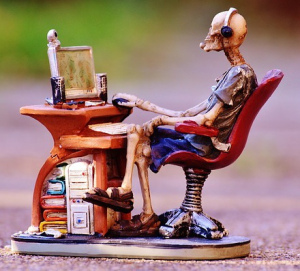 But then it was back to work. I know that I’ve mentioned it before and won’t go into detail, but the Lily Quinn monthly release schedule is difficult. Not bad! In fact, it’s helped up refine our writing process, but releasing a book a month is a tough schedule to keep up with. We’ve been managing it and I suspect that we’ll continue, but a lot of other things have fallen by the wayside – like updating the blog!
But then it was back to work. I know that I’ve mentioned it before and won’t go into detail, but the Lily Quinn monthly release schedule is difficult. Not bad! In fact, it’s helped up refine our writing process, but releasing a book a month is a tough schedule to keep up with. We’ve been managing it and I suspect that we’ll continue, but a lot of other things have fallen by the wayside – like updating the blog!
So this post isn’t to tell you to expect more of the same, but to let you know that I’m hiring my first-ever virtual assistant to help out. Yay! Everyone say hi to Amber.
Hi, Amber!
Amber is going to help us out with a lot of the administrative tasks, like compiling ebooks and uploading them to various retailers. Thanks, Amber! You’re going to save me a lot of headache.




